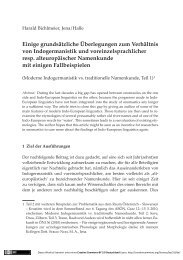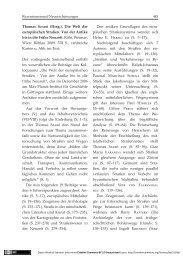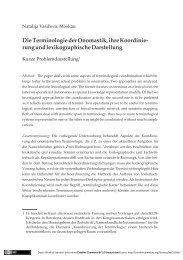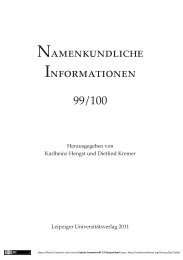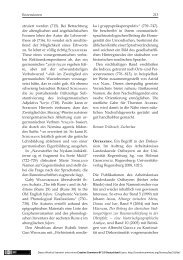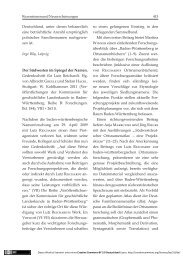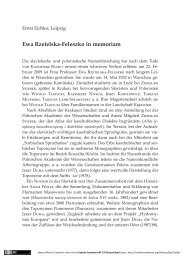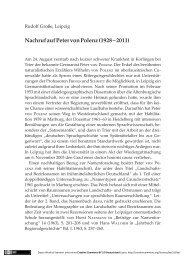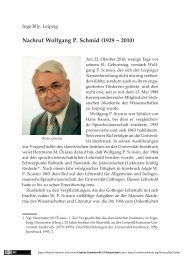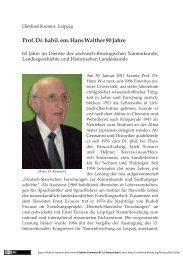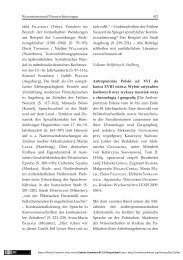Proper Names in the Light of Theoretical Onomastics
Proper Names in the Light of Theoretical Onomastics
Proper Names in the Light of Theoretical Onomastics
You also want an ePaper? Increase the reach of your titles
YUMPU automatically turns print PDFs into web optimized ePapers that Google loves.
94 V<strong>in</strong>cent Blanárm<strong>in</strong>ed identification // differentiation <strong>in</strong> particularities <strong>of</strong> a given class arenot studied <strong>in</strong> <strong>the</strong>ir language variability. These discipl<strong>in</strong>es, <strong>of</strong> course, haveestablished <strong>the</strong>ir own methodology and term<strong>in</strong>ology. The still un resolvedproblem <strong>of</strong> <strong>the</strong> mean<strong>in</strong>g <strong>of</strong> proper names is be<strong>in</strong>g elucidated from a philosophicalviewpo<strong>in</strong>t. Permanent attention is paid to <strong>the</strong> <strong>the</strong>ory <strong>of</strong> referencewhich is one <strong>of</strong> <strong>the</strong> central terms <strong>of</strong> <strong>the</strong> philosophy <strong>of</strong> language and analyticalphilosophy; <strong>the</strong> act <strong>of</strong> bestow<strong>in</strong>g a name (“ baptism”) is be<strong>in</strong>g <strong>in</strong>vestigatedwith<strong>in</strong> a causal network <strong>of</strong> <strong>the</strong> procedure <strong>of</strong> nam<strong>in</strong>g etc. In manyaspects, this research is <strong>in</strong>spir<strong>in</strong>g and contributive but, on <strong>the</strong> whole, itcannot overlay <strong>the</strong> results achieved by current onomastics which focusesits research on <strong>the</strong> analysis <strong>of</strong> <strong>the</strong> formal aspect as well as <strong>the</strong> mean<strong>in</strong>g<strong>of</strong> <strong>the</strong> onymic sign, onymic microsystems and <strong>the</strong>ir social functions. Letus give an example. Formal logic <strong>in</strong> respect <strong>of</strong> <strong>the</strong> manner <strong>of</strong> existence<strong>of</strong> a referent (an onymic object) differentiates between real proper names,improper and empty proper names (for more detail on Russell’s and Wittgenste<strong>in</strong>’s<strong>the</strong>ory <strong>of</strong> real (i. e. logical) proper names see Zouhar 2004, 212).Their def<strong>in</strong>ition <strong>of</strong> proper name does not conform to <strong>the</strong> l<strong>in</strong>guistic def<strong>in</strong>ition.One <strong>of</strong> <strong>the</strong> <strong>the</strong>oretical questions by which <strong>the</strong> philosophy <strong>of</strong> languagehas significantly <strong>in</strong>fluenced research <strong>in</strong>to proper names is <strong>the</strong> problem <strong>of</strong><strong>the</strong> mean<strong>in</strong>g <strong>of</strong> proper names. Perhaps <strong>the</strong> greatest roles were played byJ. S. Mill (mid-19 th century) and S. Kripke (2 nd half <strong>of</strong> <strong>the</strong> 20 th century).Mill stressed <strong>the</strong> notion that a proper name is a sign without mean<strong>in</strong>g,a label which we l<strong>in</strong>k <strong>in</strong> our m<strong>in</strong>ds with <strong>the</strong> image <strong>of</strong> <strong>the</strong> object named.<strong>Proper</strong> names have no attributes which would def<strong>in</strong>e <strong>the</strong> object named.They have only denotation but not connotation. This <strong>in</strong>terpretation is acceptedalso <strong>in</strong> logical semantics (compare e. g. Gahér 2006; Zouhar 2004);more recent contributions to onomastics by J. Dolník (1995, 1998) follow <strong>in</strong><strong>the</strong> tradition set by Mill. S. Kripke (1972) achieved relatively widespreadpopularity with his characterisation <strong>of</strong> proper names as rigid desig nators.Direct rigid reference exists <strong>in</strong> all possible worlds. <strong>Proper</strong> names <strong>in</strong> <strong>the</strong>subject-predicative sentence can only play <strong>the</strong> role <strong>of</strong> a subject, <strong>the</strong>y arenon-descriptive and <strong>the</strong>y are rigid referents (compare also Zouhar 2004).When Kripke, follow<strong>in</strong>g Mill (Zouhar 2004, 66 alike), says that <strong>the</strong> subjectdoes not have to have any specific properties <strong>in</strong> order to be associatedwith a name, it is valid only for <strong>the</strong> narrowly-def<strong>in</strong>ed propria usuallyused by philosophers <strong>of</strong> language and logicians. With regard to <strong>the</strong> reference<strong>of</strong> expressions <strong>in</strong> various possible worlds, <strong>the</strong> manner <strong>of</strong> referenc<strong>in</strong>gand <strong>the</strong> character <strong>of</strong> referents <strong>of</strong> expressions, <strong>the</strong> follow<strong>in</strong>g types <strong>of</strong> s<strong>in</strong>-



